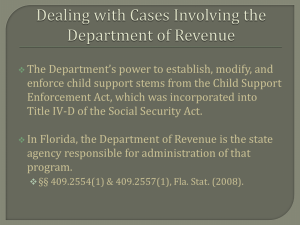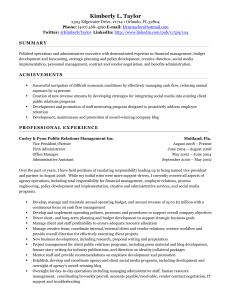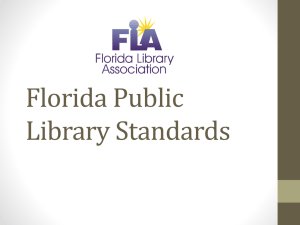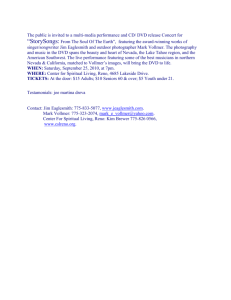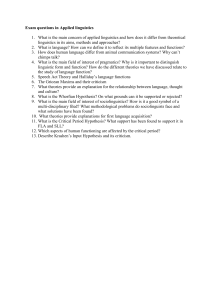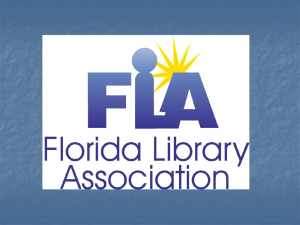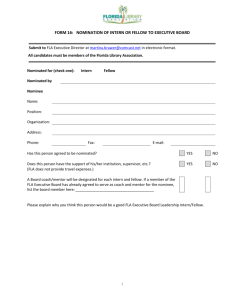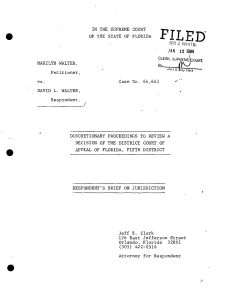Brief of Respondent On Jurisdiction
advertisement
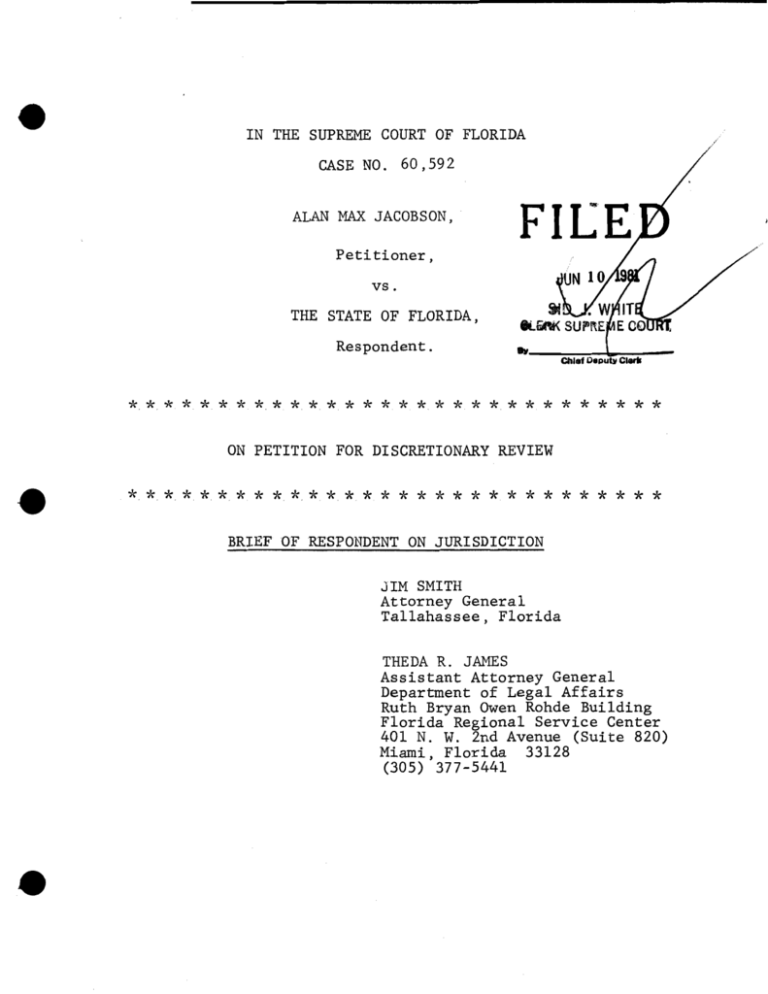
• IN THE SUPREME COURT OF FLORIDA CASE NO. 60,592 ALAN MAX JACOBSON, Petitioner, vs. THE STATE OF FLORIDA, Respondent. ****************************** ON PETITION FOR DISCRETIONARY REVIEW • ** * * * * * * * * * * * * * * * * * * * * * * * * * * * * BRIEF OF RESPONDENT ON JURISDICTION JIM SMITH Attorney General Tallahassee, Florida THEDA R. JAMES Assistant Attorney General Department of Legal Affairs Ruth Bryan Owen Rohde BUilding Florida Regional Service Center 401 N. W. 2nd Avenue (Suite 820) Miami, Florida 33128 (305) 377-5441 • • TABLE OF CONTENTS PAGE INTRODUCTION. . . . . . . . . . . . . . . . . . . . . . . . . . . . . . . . . . . . . . . . 1 STATEMENT OF THE CASE AND FACTS..................... 1 QUESTION PRESENTED.................................. 2 ARGUMENT . . . . . . . . . . . . . . . . . . . . . . . . . . . . . . . . . . . . . . . . . . . . 3- 7 CONCLUSION.......................................... 8 CERTIFICATE OF SERVICE.. . . . . . . . . . . . . . . . . . . . . . . . . . . . . 8 • • -i- • • TABLE OF CITATIONS CASES PAGE Burgess v. State, 313 So.2d 479 (Fla. 2d DCA 1975) 5 Florida Power & Light Co. v. Bell, 113 So.2d 697 (Fla. 1959) 3 Isham v. State, 369 So.2d 103 (Fla. 4th DCA 1979) 4, 7 Kyle v. Kyle, 139 So.2d 885 (Fla. 1962) 3 Nielsen v. City of Sarasota, 117 So.2d 731 (Fla. 1960) 3 Nardone v. United States, 308 U.S. 338, 60 S.Ct. 266, 84 L.Ed. 307 (1939) 5 Silverthorne Lumber Co. v. United States, 251 U.S. 385, 40 S.Ct. 182, 64 L.Ed.2d 307 (1939)...................................... 5 State v. Jacobson, Case No. 80-234, Filed April 28, 1981........... 3 State v. Webb, So.2d (Fla. Sup.Ct. 1981) (Case No. ~46, oPInion filed May 14, 1981) 7 Trustees of International Improvement Fund v. Lobean, 127 So.2d 98 (Fla. 1961)........................ 3 Vollmer v. State, 337 So.2d 1024 (Fla. 2d DCA 1976) 3, 4, 5, 6 Wong Sun v. United States, 371 U.S. 471, 83 S.Ct. 407, 9 L.Ed.2d 441 (1963) . . . . . . . . . . . . . . . . . . . . . . . . . . . . . . . . . . . . . . . . .. 5, 6 OTHER AUTHORITIES • STATUTES: §843.0l, Fla. Stat................................... §843.02, Fla. Stat................................... -ii- 4 4 • OTHER AUTHORITIES PAGE Florida Const. Article V, Sec. 3(b)(3)(1980) 3 Florida Rule of Appellate Proc. 9.030(a)(2)(A)(iv) .. 3 • • -iii- • INTRODUCTION The petitioner is the defendant in the trial court. The respondent, the State of Florida, is the prosecution. In this brief, the parties will be referred to by their proper names or as they appear before this Court. STATEMENT OF THE CASE AND FACTS Respondent accepts petitioner's statement of the case as being a substantially true and correct account of the proceedings below. • • Respondent, however, relies upon the statement of the facts as set forth in the Third District Court of Appeal opinion . -1- • QUESTION PRESENTED WHETHER THE DECISION OF THE THIRD DISTRICT COURT OF APPEAL IN THE CASE OF STATE V. JACOBSON, CASE NUMBER 80-234, FILED APRIL 28, 1981, IS IN DIRECT CONFLICT WITH PRINCIPLES OF LAW FOLLOWED IN VOLLMER V. STATE, 337 SO.2D 1074 (FLA. 2D DCA 1976) AND ISHAM V. STATE, 369 SO.2D 103 (FLA. 4TH DCA 1979)? (Restated) • • -2- • ARGUMENT THE DECISION OF THE THIRD DISTRICT COURT OF APPEAL IN THE CASE OF STATE V. JACOBSON, CASE NO. 80-234, FILED APRIL 28, 1981,IS NOT IN DIRECT CONFLICT WITH PRINCIPLES OF LAW FOLLOWED IN VOLLMER V. STATE, 337 SO.2D 1024 (FLA. 2D DCA 1976) AND ISHAM V. STATE,369 SO.2D 103 (FLA. 4TH DCA 1979). (Restated) The discretionary jurisdiction of the Supreme Court may be invoked by any decision of a District Court of Appeal that expressly and directly conflicts with a decision of another District Court of Appeal or of the Supreme Court on the same question of law. • Florida Constitution Article V, Section 3(b) (3) (1980); Florida Rules of Appellate Procedure, Rule 9.030(a) (2)(A)(iv). To invoke this type of jurisdiction antagonistic principles of law must have been announced in a case or cases based on practically the same facts. The conflict must be ob- vious and patently reflected in the decision relied on. Trustees of International Improvement Fund v. Lobean, 127 So.2d 98 (Fla. 1961). Thms, if two cases are distinguishable in controlling factual elements or if the points of law settled by the same, then no conflict can arise. 010 cases are not the Kyle v. Kyle, 139 So.2d 885 (Fla. 1962); Nielsen v. City of Sarasota, 117 So.2d 731 (Fla. 1960); Florida Power and Light Co. v. Bell, 113 So.2d 697 (Fla. 1959). Petitioner contends that the holding of the Third District Court of Appeal creates conflict on the question of whether flight fol• lowing an illegal stop constitutes a clear break in the casual -3- • chain of events sufficient to purge the taint of the initial illegality, thereby rendering as immaterial the temporal proximity of the initial illegality to the subsequent seizure. Cases cited for conflict are Vollmer v. State, 337 So.2d 1024 (Fla. 2d DCA 1976) and Isham v. State, 369 So.2d 103 (Fla. 4th DCA 1979). l~en we apply the standards for determination of jurisdiction which we have heretofore catalogued in the above-cited cases, the absence of conflict between Vollmer and the instant case becomes apparent. Vollmer involved a conviction for resisting arrest with violence contrary to Florida Statute, Section 843.01. Without any cause to believe criminal activity was afoot, a police officer stopped the defendant for questioning. • The defendant gave his name as "Bill Hollis" and the officer inquired as to whether he had any identification. When the defendant answered in the negative the officer then asked whether he had a wallet. The defendant produced a wallet and as he opened it the officer saw a Florida driver's license and asked to examine it. Upon inspection, the officer determined that the license bore a different name, "John Brian Vollmer." When the officer read the name out aloud, the defendant "took off running" and the officer gave chase on foot. officer caught the defendant a struggle ensued. Hhen the Vollmer was ar- rested for resisting an officer with violence. The synthesis forming the basis for review in that case was the sufficiency of the evidence to sustain Vollmer's conviction for resisting arrest with violence. • An arrestee cannot be convicted under either of the Florida statutes dealing with resisting arrest 1 Florida Statutes, Sections 843.01 and 843.02. -4- l • unless the arrest is lawful. See Burgess v. State, 313 So.2d 479 (Fla. 2d DCA 1975), and cases cited therein. Relying on Burgess, the Second District Court of Appeal overturned Vollmer's conviction because the evidence failed to show any lawful basis for the defendant's arrest. The evidence found on Vollmer's person was held inadmissible since the search was not justified as being incident to a lawful arrest. Vollmer v. State, supra, at 1026. The Court of Appeal in the instant case was asked to decide whether flight following an illegal stop creates a break in the casual chain of events sufficient to purge the taint of the initial illegality, thereby rendering immaterial the temporal proximity of the initial illegality to the subsequent seizure. • The record showed that the initial illegal stop of the defendant produced no evidence. The record also clearly established that Jacobson's flight was not prompted by the actions of the detaining officer, but by observing another police officer place handcuffs on his traveling companion, one Baker. The doctrine of "attenuation," firs t es tab lished in Nardone v. United States, 308 U.S. 338,60 S.Ct. 266, 84 L.Ed. 307 (1939), recognizes that challenged evidence might sometimes be admissible even~ if it does not have an "independent source." Cf. Silverthorne Lumber Co. v. United States, 251 U.S. 385, 40 S.Ct. 182, 64 L.Ed. 319 (1920) (for a discussion of the independent source doctrine). Rely- ing on Wong Sun v. United States, 371 U.S. 471, 83 S.Ct. 407, 9 L. Ed.2d 441 (1963) and its progeny, the Court of Appeal agreed with • the lower court that the stop was illegal but reversed finding that -5- • Jacobson's flight created a break in the casual chain of events sufficient to purge the taint of the initial illegality. Thus, contraband recovered as a result of the search conducted incident to Jacobson's apprehension was deemed free fron taint and thus, admissible in evidence. Our analysis of the holding in the present case discloses that the point of law followed in Vollmer, i.e. that proof of the legality of the arrest is required to sustain a conviction for resisting arrest, is not here in controversy. The present dispute involves the applicability of the Wong Sun fruit-of-the-poisonous tree doctrine to challengedevidence. • Resolution of the propriety of the stop, of course, determines whether the contraband was admissible in evidence in each case. However, the decision on that point, the material issue in the present case, does not appear to have ever been raised in Vollmer. Had this issue been presented to the court below, the facts of that case clearly show that it was the police officer's actions, and not the conduct of a third person, which prompted the defendant's flight. Thus, in Vollmer, unlike the instant case, the connection beDveen the lawless conduct of the police and the discovery of the challenged evidence has not become so attenuated as to dissipate the taint. We therefore conclude that different questions of law were involved in the two cases. • Assuming, the questions of law had been the same, the controlling facts in the instant case dictate, or at -6- • least permit, a different result. Thus, the rationale of the two cases are compatible and no conflict exists. In Isham v. State, supra, also cited as grounds for conflict, the Fourth District Court of Appeal was asked to review the propriety of the trial court's denial of the defendant's motion to suppress evidence seized as the result of a police search based on a telephone call from an anonymous tipster. The Court held that, based upon an anonymous call to police advising that defendant was on a certain street corner attempting to sell drugs, the police officer had a perfect right, and perhaps a duty, to investigate. Although upholding the stop as valid, the court held that the frisk was invalid because there was no information to suggest that Isham was armed. • It further stated that had the anonymous tip included information that Isham was armed, the frisk would have been justified. This view was recently rejected by this Court in State v. Webb, So.2d (Florida Supreme Court 1981) (Case No. 59,346, opinion filed May 14, 1981) . When we apply the standards for determination of jurisdiction which we have previously discussed, the absence of conflict between the instant case and Isham becomes apparent. The decisional point of law dispositive of the Isham situation did not in any respect involve the applicability of the "fruit-of-the-poisonous tree" doctrine. Because the stop in Isham was upheld as valid, the Court of Appeal had no reason to reach the Wong Sun issue which was dispositive of the case herein. • -7- • CONCLUSION Applying the standards for determination of jurisdiction which we have discussed herein, the absence of conflict between Vollmer v. State, 337 So.2d 1024 (Fla. 2d DCA 1976), Isham v. State, 369 So.2d 103 (Fla. 4th DCA 1979) and the case herein becomes apparent. Petitioner having failed to demonstrate conflict, the petition for discretionary review must be denied. Respectfully submitted, JIM SMITH Attorney General ~KI • THED . J S Assistant Attorney eneral Florida Regional Service Center 401 N. W. 2nd Avenue (Suite 820) Miami, Florida 33128 (305) 377-5441 CERTIFICATE OF SERVI CE I HEREBY CERTIFY that a true and correct copy of the foregoing BRIEF OF RESPONDENT ON JURISDICTION was furnished by mail to SNOWDEN, KOMREICH, REICHENTHAL & MIGDALL, P.A., Charles H. Snowden, Attorneys for Petitioner, 2000 South Dixie Highway, Suite 212, Miami, • Flori~ O~tt~ THEDA R. JAMES Assistant Attorney General -8-
